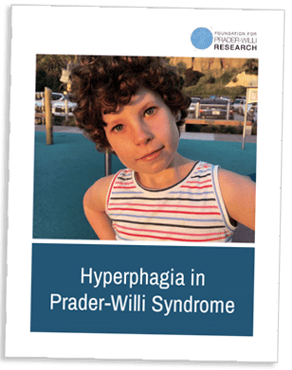
If your child has been diagnosed with Prader-Willi syndrome (PWS), you’ve most likely heard of or read about hyperphagia. This web page provides an overview of hyperphagia in PWS, including information on managing hyperphagia and new research, so you can have a better understanding of what to expect and how you can best help your child.

Hyperphagia is a hallmark of PWS. Hyperphagia is an intense, persistent sensation of hunger accompanied by:
The preceding definition comes from a paper published by the PWS Clinical Trials Consortium.
People with PWS may spend considerable effort to acquire food (“food-seeking behavior”). People with PWS may not feel full, or they may be delayed in reaching satiety compared to typical individuals, even after eating large amounts of food.
Identifying hyperphagia in PWS is challenging. We know that hyperphagia starts gradually, is difficult to measure objectively, and is highly variable. Determining if your child has hyperphagia is not as simple as checking yes or no. Because PWS has a broad spectrum, eating habits and interest in food are different for each child, and they can ebb and flow as each child grows. Some children with PWS display the characteristic hunger drive, but in others it may manifest more as obsession with food or as a lack of satiety. It may show up as a desire to talk about food or as a need to be reassured about when meals or snacks will be served. Hyperphagia may be less apparent in a “food-secure” environment (an environment where there is no access to food except at preplanned meal and snack times). In addition, the intensity of hyperphagia may decrease in some older individuals with PWS, although this does not appear to be the case for most.

People with PWS do not start life with hyperphagia. In fact, babies with PWS are often not very interested in food, and they may experience “failure to thrive” because of hypotonia (poor muscle tone), difficulties in feeding, and a lack of interest in food. This early period is followed by a time where food intake may be similar to that of typically developing children, although even when children with PWS are normal weight, they typically have more fat and less muscle mass than expected. The onset of hyperphagia varies, but it can begin at an early age (e.g., 2 years). It more commonly occurs sometime during childhood, with an average onset at approximately 8 years, but some people do not experience hyperphagia until the teen years. Hyperphagia is lifelong in most people with PWS, but eating behaviors and food interests in PWS can vary with age, and they wax and wane over time, especially in response to changes in the environment.
In PWS, the term “hyperphagia” usually encompasses characteristic behaviors around food, such as food obsessions and food-seeking behaviors. For example, even before hyperphagia becomes prominent, children with PWS may show an unusual interest in food, which can show up as excessive talking about food, such as repeatedly asking for details about what and when they will eat. As hunger increases, the hyperphagic drive to eat can lead them to sneak or steal food, to eat food that is normally considered unacceptable (e.g., food scraps, food from other people’s plates, food in the trash, raw food), get up at night to look for food, and take large bites of food and/or eat very fast.
In addition to altered hunger and satiety signals in PWS, the metabolic rate of people with PWS is lower than normal. Thus, most individuals with PWS need to consume approximately 20-40% fewer calories than typical individuals to keep from gaining weight. Simply stated, their desire for food is greater, but their need for food is less, so it is even easier for people with PWS to gain weight compared to typical individuals. Hypotonia (low muscle tone) may make it harder for people with PWS to exercise, adding to the problem. Finally, in part due to growth hormone deficiency, individuals with PWS tend to generate more fat tissue than typical individuals and to have reduced muscle mass. This “triple threat” makes it very easy to become overweight, and food intake has to be strictly regulated if the person with PWS is to maintain a healthy weight. Interventions can help, however. One important treatment is growth hormone therapy which can improve muscle mass and decrease fat in individuals with PWS. In addition, a healthy lifestyle for PWS includes a strong focus on consistent physical activity. The type of physical activity (walking, dancing, running, team sports, Special Olympics) is less important than making it fun and engaging for the person with PWS. At the 2021 FPWR conference, Dr. Nora Shields presented research on PWS and physical activity and shared findings from a new study on progressive strength training for people with PWS.

If not proactively managed, the combination of hunger and lower caloric needs can result in obesity, which can affect quality of life and lead to other health complications.
It is currently not known why babies with PWS seem to be relatively uninterested in food, while children with PWS develop hyperphagia. Why or how the brain switches from poor feeding to hyperphagia is not known, but it may reflect a problem in the hypothalamus, a small part of the brain that controls hunger and thirst, among other things, and which is thought to malfunction in PWS. Although the hypothalamus in people with PWS appears to be structurally similar to that of typically developing persons, there may be differences that are difficult to visualize, or there may be functional changes compared to the normal hypothalamus. FPWR is funding several research projects to better understand why individuals with PWS don’t have normal hunger and satiety signals. Knowledge of how appetite circuitry is altered in PWS may lead to new treatments to reduce hunger in PWS.
It’s an exciting time in the PWS field, as real progress is being made in the research laboratory toward understanding the underlying basis of hyperphagia in PWS. Studies to understand appetite control in PWS are important so that research efforts can be efficiently directed to developing new treatments. Developing new therapies to address hyperphagia has been identified as a primary goal for families of those with PWS.
Scientists are studying stem cells from people with PWS, grown into neurons in the laboratory, to understand how brain cells from people with PWS differ from those of typical individuals at the molecular level. Additional studies are examining the appetite circuitry in PWS mouse models compared to non-PWS mice, while other research is focused on brain imaging of children and adults with PWS to decipher differences in brain connectivity and function. Finally, some studies are evaluating differences in hunger hormones/signaling molecules in PWS compared to typical individuals. Complimenting these scientific studies are clinical trials evaluating potential drugs that may be able to reduce hyperphagia in people with PWS.

Altogether the goal of these studies is to identify changes in PWS that can be targeted with new drugs or devices to re-establish normal hunger and satiety.
Research related to hyperphagia in PWS is advancing every day. New studies are being launched, and findings from current and past studies have been published.
You can read about the findings from dozens of studies on hyperphagia in the hunger satiety section of our Research Publications page. You can read summaries of the research FPWR has supported on hyperphagia in PWS in the hunger satiety section of our Funded Projects page.
In clinical trials that are testing new drugs for their ability to decrease appetite in PWS, a specific questionnaire, the Hyperphagia Questionnaire for Clinical Trials Instrument, is being widely used to assess changes in hyperphagia behaviors. This instrument was donated by Zafgen, Inc., to FPWR to benefit the PWS community by promoting consistency across clinical trials. The instrument provides an assessment of the food-seeking behaviors common among persons with PWS. It has been validated in multiple clinical trials and is designed to evaluate a potential drug candidate’s impact on those food-seeking behaviors.
However, additional methods to measure hyperphagia are needed, and ideally these would be objective measures rather than reports of a parent’s observation of behaviors. Among these, measurements of eye tracking and brain activity may produce a more objective measure of hyperphagia and may be useful regardless of a participant's cognitive ability. Another project that is developing a self report of hyperphagia for people with PWS. Additional studies will be needed to determine if these kinds of measurements will be useful in clinical trials, however.
The bottom line: The broad scope and range of these studies shows the robust research effort supported by FPWR to understand hyperphagia, identify targets for drug development, and accelerate research that can improve the lives of people with PWS.
Environmental, behavioral, and nutritional management are recommended for people with PWS to prevent life-threatening obesity.
Experts in PWS nutrition recommend taking proactive steps to promote healthy eating in PWS and maintain healthy weight. This includes following nutritional guidelines, establishing food security, and promoting a healthy lifestyle. That said, it is important to understand that most people with hyperphagia will still feel hungry no matter how healthy their diet or lifestyle is.
One of the most effective ways to maintain a healthy weight in PWS is to ensure a food-secure environment in which food is not freely accessible to the person with PWS. The vast majority of people with PWS cannot be taught to control their food intake; the drive to eat is too overwhelming. In addition, many people with PWS experience anxiety when they have access to food, so a food-secure environment may also improve mental well-being.

Regular consultations with a dietitian or nutritionist can help manage weight in PWS. It’s best to work with a dietitian or nutritionist who is familiar with PWS. PWS experts also recommend enlisting the support of teachers, grandparents, caregivers, and family friends to help children and adults with PWS adhere to prescribed diets and regular exercise, while limiting exposure or access to food treats or food rewards.
Watch this video on optimal nutrition for people with PWS by pediatric registered dietitian Melanie Silverman.
The FDA approved the first treatment for PWS-associated hyperphagia in March 2025. VYKAT XR, developed by Soleno Therapeutics, is the only prescription medicine available for hyperphagia in adults and children 4 years of age and older with PWS.
Additional clinical trials are underway looking to improve hyperphagia and other symptoms of PWS. You can learn more about these studies by visiting our Clinical Trial Directory.
Growth hormone has been shown in multiple studies to be beneficial for those with PWS. After a diagnosis of PWS, starting human growth hormone therapy as soon as possible is often recommended.
Unfortunately, growth hormone is not thought to directly decrease hyperphagia in PWS, but it can still have beneficial effects on body composition that are helpful in counterbalancing the effects of hyperphagia. Growth hormone therapy can help decrease body fat, increase muscle mass, improve weight distribution, increase stamina, and improve bone health, all of which is important in maintaining a healthy weight and lifestyle in PWS.
The PWS Weight Study, conducted by FPWR and published in the Orphanet Journal of Rare Diseases, showed that a higher percentage of life on growth hormone therapy was associated with statistically improved weight and BMI in individuals with PWS.
After a diagnosis of PWS, it can be easy to be overwhelmed by new information and terminology. The idea of hyperphagia can be hard to grasp, especially since symptoms may take years to appear, and when they do, they are different for each person.
What you can do is stay positive. Talk to your doctor about what to watch for and how best to help your child. Join a supportive community of other parents and caregivers on the PWS journey by visiting our Newly Diagnosed page, following us on Facebook, subscribing to the FPWR blog and enewsletter, and attending our conference. And know that there are teams of researchers that right now are actively pursuing new approaches and treatments for hyperphagia.
Another proactive step is to get involved in the PWS research. Here are two important ways to take action:

The Global PWS Registry is a powerful tool researchers and scientists use to analyze PWS patient data to enhance our understanding of PWS. By participating, people with PWS become part of the research team, helping uncover trends in causes and diagnosis as well as new directions in therapies and treatment. Learn more and watch a quick explainer video on our PWS Global Registry page.
New studies start regularly throughout the United States and around the world. Participation adds to the knowledge base and can have important implications for preventing and ending hyperphagia. Learn more on the PWS Clinical Trials page, where you can subscribe to updates and view an interactive map on new studies starting near you.
Hyperphagia is a hallmark symptom of PWS, with a changing face that can make it difficult to understand and treat. But there are solutions and there is hope.
The more we know about hyperphagia and the PWS population, the more we will advance our understanding and the more we will improve the lives of people with PWS.

The Foundation for Prader-Willi Research (federal tax id 31-1763110) is a nonprofit corporation with federal tax exempt status as a public charity under section 501(c)(3).



The mission of FPWR is to eliminate the challenges of Prader-Willi syndrome through the advancement of research and therapeutic development.
Copyright © 2020. All Rights Reserved. Terms of Use. Privacy Policy. Copyright Infringement Policy. Disclosure Statement.